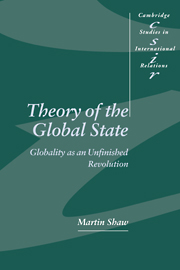9 - Politics of the unfinished revolution
Published online by Cambridge University Press: 07 October 2009
Summary
If politics are about social relations in the broadest sense, as we have increasingly come to understand, they are also about power, and especially about state power. The key questions of all politics are whether, and how, the power and organization of state can be brought into harmony with the needs of society – of people in their social relations.
Classic modern answers to this question have hinged on how malleable state power in general, or in its particular forms, has been taken to be. For anarchists, the very character of the state as a distinct centre of power prevents it being useful to society. Liberals and socialists, in contrast, while often agreeing with anarchists that the concentration of power in the state is problematic, have seen it as more adaptable to social needs. They have argued instead (as in the classic socialist debate about reform and revolution) about the suitability of particular forms of state for meeting social needs or furthering social transformation.
These arguments have been about two aspects of the social relations of state institutions: how far given forms of state are necessarily linked to certain social interests, and whether they are inescapably repressive or bureaucratic. Although the location of politics within an international framework has clearly been recognized, in the modern era politics has generally been defined or understood primarily within a national context.
- Type
- Chapter
- Information
- Theory of the Global StateGlobality as an Unfinished Revolution, pp. 259 - 270Publisher: Cambridge University PressPrint publication year: 2000



